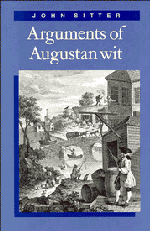Book contents
Conclusion
Published online by Cambridge University Press: 28 January 2010
Summary
Because this study is an attempt to explain how and why I think several works of the late seventeenth and early eighteenth century matter collectively and currently in literary education, an excursion into pedagogical autobiography may be candid rather than self-indulgent. Increasingly over the past decade I have found myself responding to various questions about the interpretation of literature which come roughly to a single question. Typically, “the” question is posed by a genuinely troubled undergraduate, who has read or heard enough about recent critical theory to know or suspect some of the following: that thematic or existential interpretations are now often regarded as naive or nostalgic, that “ethical” or “humanist” criticism may be seen as overly exclusive of some groups and overly flattering to others, and that literary texts are considered by many to be essentially self-referential and “undecidable,” as reflections of or on the problems of expression. In some form and at some point, then, he or she asks: “Are we supposed to think that literature is about life or about language?” Not liking the alternatives, but trying to honor the broad terms of the question, I have taken to replying that “literature is about life in language.”
- Type
- Chapter
- Information
- Arguments of Augustan Wit , pp. 175 - 186Publisher: Cambridge University PressPrint publication year: 1991

